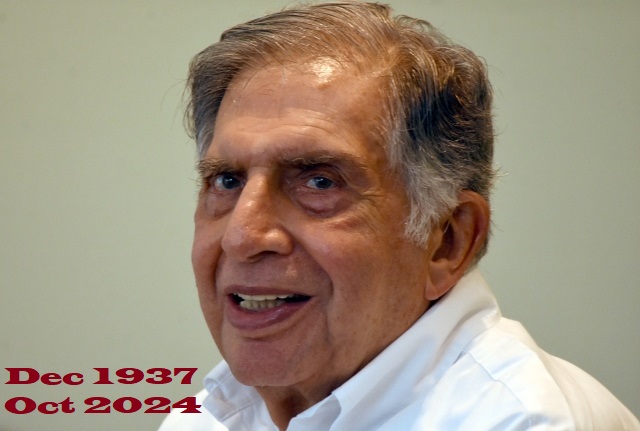Sir Ratan Tata, a name synonymous with integrity, innovation, and philanthropy, has left an indelible mark on India and the world. Born on December 28, 1937, into the illustrious Tata family, Ratan Tata was destined to play a significant role in shaping the industrial landscape of India. His academic journey took him to Cornell University, where he graduated with a degree in architecture. However, his true calling lay in the family business, which he joined in 1961. Ratan Tata inherited leadership at a time when India faced tremendous challenges, including the impact of World War II. His ability to navigate these complexities and transform Tata Group into a global powerhouse stands as a testament to his vision and leadership skills.
Under Ratan Tata’s guidance, Tata Group diversified into various sectors, including steel, automobiles, and information technology, marking significant milestones along the way. One of his crowning achievements was the establishment of Tata Consultancy Services (TCS), which emerged as a global leader in IT services. This move not only showcased India’s potential in technology but also established a model for how businesses could thrive on a global scale. Ratan Tata’s foresight in acquiring iconic brands like Jaguar Land Rover and Tata Motors redefined the automotive sector in India, integrating global standards of quality and innovation.
Ratan Tata’s leadership philosophy was grounded in the principles of ethical governance and corporate responsibility. He firmly believed that the success of a business should not solely be measured by financial performance but also by its contributions to society. This perspective was woven into the very fabric of Tata Group, fostering a culture of integrity, sustainability, and community engagement. His vision extended beyond profitability; he aspired for businesses to serve as vehicles for positive change in society.
Philanthropy was an integral part of Ratan Tata’s legacy. Continuing the traditions set by his ancestors, he championed numerous initiatives aimed at uplifting marginalized communities across India. The Tata Trusts, which hold a significant portion of the group’s wealth, have funded initiatives addressing healthcare, education, and poverty alleviation. Ratan Tata’s unwavering belief in the transformative power of education drove him to invest in various educational institutions and programs that aimed to provide quality learning opportunities for underprivileged youth. He understood that education was a pathway to empowerment and economic independence, and his contributions in this area have had a lasting impact on countless lives.
In the realm of healthcare, Ratan Tata was a staunch advocate for accessible and affordable services. His investments in medical research and the establishment of hospitals focused on providing healthcare to underserved populations. Under his leadership, Tata Group made significant contributions to public health initiatives, addressing critical issues and improving health outcomes in vulnerable communities. Ratan Tata’s commitment to enhancing healthcare access illustrated his vision of a healthier, more equitable India.
Ratan Tata’s dedication to social causes extended to environmental sustainability, reflecting his understanding of the interconnectedness of business and the planet. He recognized the importance of protecting the environment for future generations and led the Tata Group in adopting green technologies and sustainable practices. His advocacy for corporate social responsibility encouraged other businesses to embrace sustainability, creating a ripple effect across industries. Ratan Tata’s emphasis on sustainable growth highlighted the necessity of integrating ecological considerations into business strategies, ensuring that economic development did not come at the expense of the environment.
Throughout his illustrious career, Ratan Tata embodied the essence of visionary leadership. His ability to anticipate market trends and adapt to changing landscapes distinguished him as a leader who could navigate complexities with agility. His tenure at Tata Group earned him numerous accolades, including honorary doctorates and international recognition for his contributions to industry and society. As he stepped down as chairman of Tata Group in 2012, he left behind a legacy of excellence that continues to inspire business leaders and entrepreneurs globally.
The news of Sir Ratan Tata’s passing on September 9, 2024, reverberated through the nation, marking a profound loss for India and the world. His departure leaves a void that is difficult to fill, as he embodied the ideals of leadership, integrity, and service. The outpouring of grief from leaders, business figures, and citizens alike reflects the profound impact he had on countless lives. His life was a testament to the belief that businesses can serve as powerful instruments for positive change, capable of driving economic growth while addressing pressing social issues.
Ratan Tata’s contributions to education and healthcare have paved the way for transformative changes in these sectors. His initiatives aimed at enhancing access to quality education and healthcare for underprivileged communities underscore his deep understanding of the challenges faced by marginalized populations. His support for skill development programs and vocational training has empowered countless individuals to build better futures for themselves and their families. His vision for education was rooted in the idea that knowledge is a powerful tool for social mobility, and his efforts have opened doors for many.
The impact of Ratan Tata’s philanthropic endeavors extends beyond immediate contributions; it has inspired a culture of giving within the corporate world. His commitment to social causes has set a benchmark for corporate philanthropy in India, encouraging other businesses to engage in meaningful initiatives that address societal challenges. The Tata Trusts continue to be a leading force in various philanthropic efforts, ensuring that Ratan Tata’s legacy of compassion and service endures.
Ratan Tata’s vision for a just and equitable society resonated through his active engagement in public discourse on important social issues. He utilized his platform to advocate for change, sparking conversations about economic inequality, education, and healthcare. His perspectives challenged the status quo, inspiring a collective effort to build a more equitable society. His involvement in various forums and initiatives showcased his commitment to nation-building, emphasizing the importance of collaboration among diverse stakeholders to address pressing challenges.
The legacy of Sir Ratan Tata is a reminder that true leadership extends beyond personal success; it encompasses a deep sense of responsibility towards society, a commitment to uplifting others, and a vision for a better future. His life serves as a powerful illustration of the potential for individuals to effect change and create a positive impact. In an era marked by numerous challenges, his dedication to social justice, education, and healthcare offers a guiding light for those striving to make a difference.
As we reflect on Ratan Tata’s life and contributions, we must recognize the values he championed integrity, empathy, and a relentless pursuit of excellence. His departure is not only a loss for the Tata Group but for the entire nation that benefited from his vision and commitment to social betterment. The ideals he embodied will continue to resonate, encouraging individuals and organizations to strive for excellence while making meaningful contributions to their communities.
In the wake of his passing, leaders in business and society must honor Ratan Tata’s legacy by upholding the principles he championed. The need for compassionate leadership, social responsibility, and sustainable practices has never been more pressing. Ratan Tata’s vision of a compassionate and equitable world remains a guiding light for those aspiring to make a difference in their communities.
The world has lost a remarkable leader, but his influence will continue to inspire countless individuals to follow in his footsteps. As we mourn the loss of Sir Ratan Tata, we celebrate a life dedicated to excellence, compassion, and innovation. His legacy will endure in the hearts of those he touched and in the institutions he built. Ratan Tata’s unwavering belief in the potential for business to drive positive social change will echo through the annals of history, encouraging future generations to embrace the ideals of service and leadership. His contributions to India and the world will be remembered as a testament to the power of one individual’s vision to create lasting change, paving the way for a brighter and more equitable future.
.For more details visit us: https://lokmarg.com/


